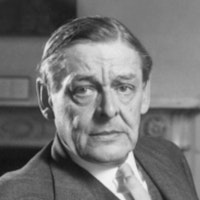Where is the Life we have lost in living? Where is the wisdom we have lost in knowledge? Where is the knowledge we have lost in information?
T. S. Eliot

Where Is the Life
Topic: Wisdom & Understanding
The endless cycle of idea and action,
Endless invention, endless experiment,
Brings knowledge of motion, but not of stillness;
Knowledge of speech, but not of silence;
Knowledge of words, and ignorance of the Word.
All our knowledge brings us nearer to our ignorance,
All our ignorance brings us nearer to death,
But nearness to death no nearer to GOD.
Where is the Life we have lost in living?
Where is the wisdom we have lost in knowledge?
Where is the knowledge we have lost in information?
The cycles of Heaven in twenty centuries
Bring us farther from GOD and nearer to the Dust.
Thomas Stearns Eliot was born on September 26, 1888, in St. Louis, Missouri, USA, and became a defining figure in literature. At the age of 25, he relocated to England, marking a pivotal shift in his life. This move in 1914 led to his eventual adoption of British citizenship in 1927, a choice that reflected his integration into and commitment to his new home. His life in England closely intertwined with his literary career and his engagement with the cultural scene.
Eliot emerged as a key figure in the Modernist movement with his 1915 poem "The Love Song of J. Alfred Prufrock." His later works, including "The Waste Land" (1922), "The Hollow Men" (1925), "Ash Wednesday" (1930), and "Four Quartets" (1943), reshaped modern literature, reflecting the complexities of the early 20th century. His extensive influence extended to drama, with seven plays to his credit, demonstrating his range and depth as a writer.
In 1948, Eliot received the Nobel Prize in Literature for his pioneering contributions to contemporary poetry. His legacy is intertwined with places significant to his life and writings, such as East Coker, a village connected to his ancestry and where his ashes are interred. A plaque in St Michael’s Church there captures the essence of his life's journey: "In my beginning is my end. Of your kindness, pray for the soul of Thomas Stearns Eliot, poet. In my end is my beginning." This line underscores the cyclical nature of his existence and his enduring impact on literature.
Choruses from "The Rock"
Eliot, Thomas Stearns. The Complete Poems and Plays, 1909-1950. Harcourt Brace Jovanovich, 1980, p. 96 [T. S. Eliot, Choruses from "The Rock"].

T. S. Eliot
Theme: Wisdom

About This T. S. Eliot Quotation [Commentary]
T. S. Eliot’s incisive questions, “Where is the Life we have lost in living? Where is the wisdom we have lost in knowledge? Where is the knowledge we have lost in information?” express a deep concern over the erosion of genuine wisdom amidst the modern deluge of information. His inquiry underscores a significant loss—not of physical objects, but of vital human experiences and insights. Eliot exclaims that our relentless pursuit of information, driven by rapid technological advancement and constant data accumulation, have distanced us from the wisdom that truly enriches life. This type of wisdom arises not just from accumulating facts, but from rich experiences and contemplative introspection.
In the complete poem, Eliot expands his critique, highlighting a stark contrast between ceaseless activity and the overlooked values of stillness and silence. He observes, “The endless cycle of idea and action, endless invention, endless experiment, brings knowledge of motion, but not of stillness; Knowledge of speech, but not of silence.” Here, Eliot points out that wisdom is cultivated in quiet and contemplative moments, allowing us to transcend superficial chatter and connect with the essence of the ‘Word’, symbolizing Spiritual understanding.
Eliot’s reflection on the spiritual dimension of this discourse reveals how an abundance of information might actually bring us closer to ignorance and mortality, rather than to divine enlightenment. He depicts a historical shift that has, over centuries, moved humanity away from its spiritual core and towards more ephemeral, materialistic concerns. Eliot’s critique is not merely a lament; it is a call to reevaluate our approaches to knowledge and fulfillment. He advocates for a rediscovery of wisdom that harmoniously integrates intuitive understanding, self-transcendence, and the wonder of being alive.
Additional T. S. Eliot Quotes
Resources
Related Quotes
Copyright © 2017 – 2024 LuminaryQuotes.com About Us